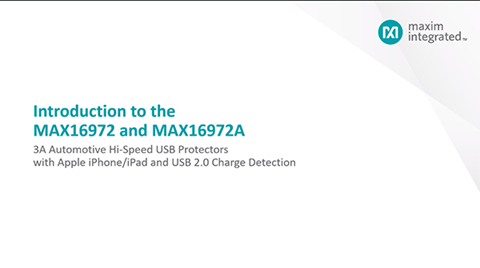The MAX16972/MAX16972A provide high-ESD and short-circuit protection for the low-voltage internal USB data and USB power line in automotive radio, navigation, connectivity, and USB hub applications. The devices support both Hi-Speed USB (480Mbps) and full-speed USB (12Mbps) operation. In addition, the devices also include integrated circuitry to enable fast-charging for consumer devices adhering to either the Apple method or the Hi-Speed USB host-charger port-detection protocol and support USB On-The-Go (OTG).
The short-circuit protection features include short-to-battery on the protected HVBUS, HVD+, and HVD- outputs, as well as short-to-HVBUS on the protected HVD+ and HVD- outputs. The devices are capable of a short-to-battery condition of up to +18V. Short-to-GND and overcurrent protection are also provided on the HVBUS output to protect the internal BUS power rail from overcurrent faults.
Each device features high-ESD protection to ±15kV Air Gap method and ±8kV Contact method on all protected HVBUS, HVD+, and HVD- outputs.
Each device features two low 4.0Ω on-resistance Hi-Speed USB switches, a current-limited low-voltage 31mΩ BUS switch, and provides an integrated high-voltage external power-switch controller. The BUS switch can start up into large capacitive noncompliant USB loads. The devices also feature an enable input, a fault output, integrated Apple iPhone®/iPad® fast-charging termination resistors, and an integrated host-charger port-detection circuit adhering to the USB 2.0 battery charging specification version 1.2.
The devices are available in 16-pin QSOP and 16-pin (4mm × 4mm) TQFN packages and operate over the -40°C to +105°C temperature range. The MAX16972 and MAX16972A are drop-in compatible with MAX16970,MAX16971, MAX16970A, MAX16971A, MAX16917, MAX16919, and MAX16969 devices.
Applications
- Automotive Connectivity
- Automotive Radio and Navigation
- Telematics
- USB Hub




